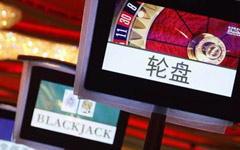SJM Holdings Ltd Chief Executive Officer Ambrose So said he's bearish about Macao gambling revenue from high rollers over the next six months as President Xi Jinping escalates his anti-corruption drive.
The chief executive of Asia's largest casino operator expects industrywide gaming revenue to be flat or drop slightly this year, So said in an interview in Macao on Tuesday. He forecast a "high single-digit" growth for 2015.
 |
| Macao tourism 'golden', while HK loses shine |
 |
| Tough luck as Macao gamblers lie low |
"The prospect of VIP market is gloomy," So said. "If you ask me now, I'm bearish toward the VIP market for the next six months. I don't know how to read the future beyond that."
Macao's casino industry is bracing for its longest losing streak as the Chinese government's crackdown on extravagance has prompted high-stakes bettors or the so-called VIPs, to stay away from China's only city where casinos are legal. This has dented the earnings of companies from Wynn Macao Ltd to Melco Crown Entertainment Ltd and their shares also suffered, with SJM falling 42 percent this year, the biggest slump among its peers.
The industry could be further affected by Xi's expected visit to Macao next month as part of the 15th anniversary celebration of Macao's handover to China, Union Gaming Research analyst Grant Govertsen said.
"The government will probably give a review of the campaign next year" during the annual meetings for the national legislature and top political advisory body, So said. "If the campaign is not going to expand further in any sense, things may start to improve. Impact from the campaign is mainly psychological."
Macao casino revenue, which has grown 2.3 percent in the year to date, may fall 0.6 percent year-on-year, according to a median estimate of nine analysts surveyed by Bloomberg News. The market may rebound to a 2 percent growth next year, according to a median estimate of 12 analysts surveyed.
Macao recorded the slowest annual growth in casino revenue in 2009 with a 9.7 percent gain and it has not seen a yearly decline since records started in 2002.
To boost revenue, the company next year will shift more tables to target the so-called premium mass-market gamblers, So said. Five tables have already been converted in October and 15 more will be moved by the end of this year, he said.
Premium-mass gamblers, who bet in cash, provide better margins than high rollers because they do not require junket operators, who charge casino companies a commission to bring in VIP customers and arrange credit for their gambling trips.
"We have to take these steps to reconfigure our tables until the opening of our new resort in 2017," So said. "This way we could maintain our market share. Even though it may continue to drop, it will be less severe."
Hong Kong-listed SJM ranked second in the Macao casino market with a share of 22.6 percent in the third quarter. Sands China Ltd was No 1 with a 23.2 percent share, according to Karen Tang, an analyst at Deutsche Bank AG.
"If you could stop losing market share or lose at a slower rate, it is already a win in the current environment," So said.
SJM owns 20 out of the 35 casinos in Macao, the most among its peers. It is the last company among the city's six operators to open a property in the increasingly popular Cotai Strip, the Asian equivalent of the Las Vegas Strip. Galaxy Entertainment Group Ltd will be the first to open with a phase two expansion of its main Galaxy Macao resort in the middle of next year.
Galaxy now has the most revenue from high rollers among the city's casino operators, overtaking SJM, according to Bloomberg Intelligence.
SJM, founded by Macao gambling mogul Stanley Ho, reported this week adjusted earnings before interest, taxes, depreciation and amortization fell 14 percent in the third quarter to HK$1.75 billion ($225.7 million). This was below an average estimate of HK$1.91 billion from six analysts compiled by Bloomberg.
